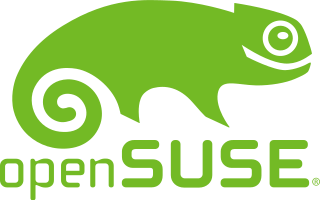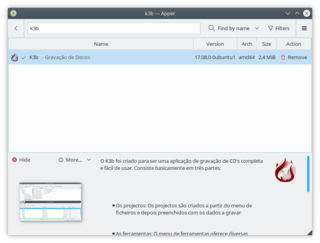
A Linux distribution is an operating system made from a software collection that includes the Linux kernel, and often a package management system. Linux users usually obtain their operating system by downloading one of the Linux distributions, which are available for a wide variety of systems ranging from embedded devices and personal computers to powerful supercomputers.

YaST is a Linux operating system setup and configuration tool.

GNOME Evolution is the official personal information manager for GNOME. It has been an official part of GNOME since Evolution 2.0 was included with the GNOME 2.8 release in September 2004. It combines e-mail, address book, calendar, task list and note-taking features. Its user interface and functionality is similar to Microsoft Outlook. Evolution is free software licensed under the terms of the GNU Lesser General Public License (LGPL).
Libranet was an operating system based on Debian.

GNU GRUB is a boot loader package from the GNU Project. GRUB is the reference implementation of the Free Software Foundation's Multiboot Specification, which provides a user the choice to boot one of multiple operating systems installed on a computer or select a specific kernel configuration available on a particular operating system's partitions.
Technical variations of Linux distributions include support for different hardware devices and systems or software package configurations. Organizational differences may be motivated by historical reasons. Other criteria include security, including how quickly security upgrades are available; ease of package management; and number of packages available.

openSUSE is a free and open source RPM-based Linux distribution developed by the openSUSE project.

SUSE Linux Enterprise is a Linux-based operating system developed by SUSE. It is available in two editions, suffixed with Server (SLES) for servers and mainframes, and Desktop (SLED) for workstations and desktop computers. Its major versions are released at an interval of 3–4 years, while minor versions are released about every 12 months. SUSE Linux Enterprise products receive more intense testing than the upstream openSUSE community product, with the intention that only mature, stable versions of the included components will make it through to the released enterprise product.
SUSE Linux is a computer operating system developed by SUSE. It is built on top of the free and open source Linux kernel and is distributed with system and application software from other open source projects. SUSE Linux is of German origin, its name being an acronym of "Software und System-Entwicklung", and it was mainly developed in Europe. The first version appeared in early 1994, making SUSE one of the oldest existing commercial distributions. It is known for its YaST configuration tool.
OtherOS is a feature of early versions of the PlayStation 3 video game console, allowing user installed software, such as Linux or FreeBSD. The feature was removed since system firmware update 3.21, released on April 1, 2010.

Wubi is a free software Ubuntu installer, that was the official Windows-based software, from 2008 until 2013, to install Ubuntu from within Windows, to a single file within an existing Windows partition.
Just enough operating system is a paradigm for customizing operating systems to fit the needs of a particular application such as for a software appliance. The platform only includes the operating system components required to support a particular application and any other third-party components contained in the appliance. This makes the appliance smaller, faster and potentially more secure than an application running under a full general-purpose OS.

win32-loader is a component of the Debian Linux distribution that runs on Windows and has the ability to load the actual Debian installer either from the network or from CD-ROM media.
ZYpp is a package manager engine that powers Linux applications like YaST, Zypper and the implementation of PackageKit for openSUSE and SUSE Linux Enterprise. Unlike some more basic package managers, it provides a satisfiability solver to compute package dependencies. It is a free and open-source software project sponsored by Novell and licensed under the terms of the GNU General Public License v2 or later. ZYpp is implemented mostly in the programming language C++.

RPM Package Manager (RPM) is a free and open-source package management system. The name RPM refers to the .rpm file format and the package manager program itself. RPM was intended primarily for Linux distributions; the file format is the baseline package format of the Linux Standard Base.

AppStream is an agreement between major Linux vendors to create an infrastructure for application installers on Linux and sharing of metadata.

Apper is a free and open source Linux front-end application for the PackageKit package management service by KDE.
Dracut is a set of tools that provide enhanced functionality for automating the Linux boot process. The tool named dracut is used to create a Linux boot image (initramfs) by copying tools and files from an installed system and combining it with the Dracut framework, which is usually found in /usr/lib/dracut/modules.d.

GeckoLinux is a Linux distribution based on openSUSE. It is available in two editions: Static, which is based on openSUSE Leap, and Rolling, which is based on openSUSE Tumbleweed.











